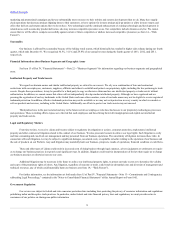Overstock.com 2013 Annual Report Download - page 19
Download and view the complete annual report
Please find page 19 of the 2013 Overstock.com annual report below. You can navigate through the pages in the report by either clicking on the pages listed below, or by using the keyword search tool below to find specific information within the annual report.
Table of Contents
We may incur substantial indebtedness.
At December 31, 2013, we had no indebtedness for borrowed money, and our only credit facility was a $3 million facility for the issuance of letters
of credit. However, in the future we may incur substantial indebtedness. Any such indebtedness would increase our business risks substantially, including
our vulnerability to industry downturns and competitive pressures. Further, financing may not be available to us on acceptable terms, or at all.
Existing or future government regulation could harm our business.
We are subject to regulation at the federal, state and international levels, including regulation relating to privacy, security, retention, transfer and use
of personal user information and telemarketing laws. Increasing regulation, along with increased governmental or private enforcement, may increase the cost of
our business. Compliance with existing and new privacy and security laws may be difficult and costly and may further restrict our ability to collect
demographic and personal information from users, which could harm our marketing efforts, and could require us to implement new and potentially costly
processes, procedures and/or protective measures. The expansion of these and other laws, both in terms of their number and their applicability to the Internet
could also harm our business. Many laws, adopted prior to the advent of the Internet, do not contemplate or address the unique issues raised thereby.
Consequently, courts or regulators may apply these laws to Internet commerce in ways that may present difficult or impossible compliance challenges. Many
of those laws that do reference the Internet are still being interpreted by the courts and their applicability and reach are therefore uncertain. Moreover, Internet
advances and innovations may result in new questions about the applicability and reach of these laws. Additionally, laws governing the permissible contents
of products may adversely affect us, and we are subject to federal and state consumer laws, including those governing advertising, product labeling, product
content requirements and product safety, and mandated website disclosures about programs to eliminate abusive labor practices in our supply chain. The laws
not only apply to future manufacture of consumer product, but also apply to existing inventories and may cause us to incur losses for any non-compliant
items in our inventory, or which we may have sold which may subject us to regulatory or civil actions. Some of the products we sell or manufacture may,
under statutory or common law, from time to time expose us to claims related to personal injury, death, environmental or property damage and may from time
to time require product recalls or other actions which may not be covered, in whole or in part, by our liability insurance. These current and future laws and
regulations could harm our business, prospects, financial condition and results of operation.
General economic factors may adversely affect our financial performance.
General economic conditions may adversely affect our financial performance. In the United States, changes in interest rates, changes in fuel and
other energy costs, weakness in the housing market, inflation or deflation or expectations of either inflation or deflation, higher levels of unemployment,
unavailability or limitations of consumer credit, higher consumer debt levels or efforts by consumers to reduce debt levels, higher tax rates and other changes
in tax laws, overall economic slowdown, changes in consumer desires affecting demand for the products and services we sell and other economic factors could
adversely affect consumer demand for the products and services we sell, change the mix of products we sell to a mix with a lower average gross margin and
result in slower inventory turnover and greater markdowns on inventory. Higher interest rates, transportation costs, inflation, higher costs of labor, insurance
and healthcare, foreign exchange rates fluctuations, higher tax rates and other changes in tax laws, changes in other laws and regulations and other economic
factors in the United States can increase our cost of sales and operating, selling, general and administrative expenses, and otherwise adversely affect our
operations and operating results. These factors affect not only our operations, but also the operations of suppliers from whom we purchase goods, a condition
that can result in an increase in the cost to us of the goods and services we sell.
Decreases in discretionary consumer spending may have an adverse effect on us.
A substantial portion of the products and services we offer are products or services that consumers may view as discretionary items rather than
necessities. As a result, our results of operations are sensitive to changes in macro-economic conditions that impact consumer spending, including
discretionary spending. Difficult macro-economic conditions, particularly high levels of unemployment, also impact our customers’ ability to obtain
consumer credit. Other factors, including consumer confidence, employment levels, interest rates, tax rates, consumer debt levels, and fuel and energy costs
could reduce consumer spending or change consumer purchasing habits. Slowdowns in the U.S. or global economy, or an uncertain economic outlook, could
materially adversely affect consumer spending habits and our operating results.
18
























